PRESENT TIME AND FUTURE
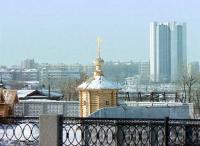 At
present, Yekaterinburg is one of Russia's biggest industrial centers.
Its enterprises produce industrial goods for heavy machinery and
chemical plant construction, for transportation, and military purposes.
There are also numerous metallurgy and chemical enterprises. Verkh-Iset'metallurgical
plant, Uralmash, Uralelektrotiazhmash, and Turbomotornyi Zavod production
units are well known throughout the country and abroad. At
present, Yekaterinburg is one of Russia's biggest industrial centers.
Its enterprises produce industrial goods for heavy machinery and
chemical plant construction, for transportation, and military purposes.
There are also numerous metallurgy and chemical enterprises. Verkh-Iset'metallurgical
plant, Uralmash, Uralelektrotiazhmash, and Turbomotornyi Zavod production
units are well known throughout the country and abroad.
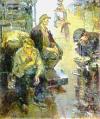 Plants
and factories of the former military industrial complex are being
energetically converted now to produce goods for the civil sector
of the national economy. Vector production unit, Ural optical and
mechanical plant, Ural plant for electrical machinery, and Uraltransmash
have been among the most successful in converting production to
civilian uses. Yekaterinburg's railroad station is the largest in
Europe, and Koltsovo Airport now has regular international flights
to the Middle East, with service planned for Germany and China. Plants
and factories of the former military industrial complex are being
energetically converted now to produce goods for the civil sector
of the national economy. Vector production unit, Ural optical and
mechanical plant, Ural plant for electrical machinery, and Uraltransmash
have been among the most successful in converting production to
civilian uses. Yekaterinburg's railroad station is the largest in
Europe, and Koltsovo Airport now has regular international flights
to the Middle East, with service planned for Germany and China.
Yekaterinburg is 490 square kilometers in size. As of January 1,
1993, it had a population of 1, 356, 300, 60.5% of which is of working
age.
Yekaterinburg possesses strong scientific and technological potential.
The Ural Division of the Russian Academy of Sciences, which includes
sixteen research institutes, is located here. In addition, Yekaterinburg
has fifteen institutions of higher education and numerous research
institutes for metallurgy and machine construction, high-tech, and
military purposes. Research and development underway in the city
is at a world-class level.
 183
secondary schools, and more than 30 colleges, are located in Yekaterinburg.
More than 15, 000 specialists graduate every year from 15 institutions
of higher education. 13 Academicians and 23 corresponding members
of the Russian Academy of Sciences (the highest level attainable
in Russian science), and 30, 000 researchers work in Yekaterinburg's
institutes. 183
secondary schools, and more than 30 colleges, are located in Yekaterinburg.
More than 15, 000 specialists graduate every year from 15 institutions
of higher education. 13 Academicians and 23 corresponding members
of the Russian Academy of Sciences (the highest level attainable
in Russian science), and 30, 000 researchers work in Yekaterinburg's
institutes.
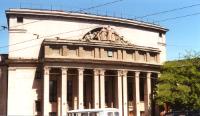 Yekaterinburg
is among the leading financial centers of the country. Its banks
and insurance companies are playing an active role in the creation
of a market economy. Such banks as Uralkombank, Uralpromstroibank,
Uralvneshtorgbank, Zavodkombank, Uralakadembank, and the Ural Bank
for Reconstruction and Development are most prominent among business
circles. Yekaterinburg
is among the leading financial centers of the country. Its banks
and insurance companies are playing an active role in the creation
of a market economy. Such banks as Uralkombank, Uralpromstroibank,
Uralvneshtorgbank, Zavodkombank, Uralakadembank, and the Ural Bank
for Reconstruction and Development are most prominent among business
circles. 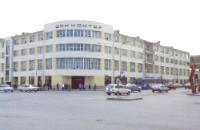 In
the trade and services field, Ural Trade Company, Ural-Region, Uralbusiness,
Technesis, Ural Brokerage Company, Europe-Asia Company are among
the most respected. The movement toward a market economy is affecting
the manufacturing sector, as well. 52 manufacturing, construction,
and transportation enterprises are moving toward becoming joint
stock companies and private firms, and the giant of the region,
Uralmash, already has converted to joint-stock ownership. Finally,
Yekaterinburg's stock exchanges and investment funds are actively
contributing to the success of privatization in the city. In
the trade and services field, Ural Trade Company, Ural-Region, Uralbusiness,
Technesis, Ural Brokerage Company, Europe-Asia Company are among
the most respected. The movement toward a market economy is affecting
the manufacturing sector, as well. 52 manufacturing, construction,
and transportation enterprises are moving toward becoming joint
stock companies and private firms, and the giant of the region,
Uralmash, already has converted to joint-stock ownership. Finally,
Yekaterinburg's stock exchanges and investment funds are actively
contributing to the success of privatization in the city.
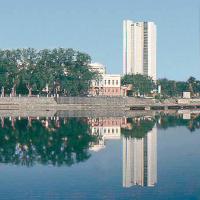 There
are 1, 971 joint-stock companies, 12, 257 limited liability companies,
16 corporations, 109 associations, 4 consortiums, 62 banks, 36 insurance
companies, 1 stock exchange, 4 commodity exchanges, and 17 investment
funds operating in Yekaterinburg's non-governmental sector. There
are 1, 971 joint-stock companies, 12, 257 limited liability companies,
16 corporations, 109 associations, 4 consortiums, 62 banks, 36 insurance
companies, 1 stock exchange, 4 commodity exchanges, and 17 investment
funds operating in Yekaterinburg's non-governmental sector.
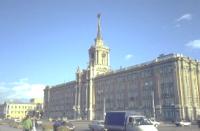 Yekaterinburg's
municipal infrastructure is well established. Tram, trolleybus,
and bus services connect all parts of the city, and the first line
of the city's new underground metro recently opened to great fanfare.
Numerous stores, restaurants, cafes, and service centers dot the
city. Yekaterinburg's health system—which includes a cardiology
center, a cancer treatment facility, a highly advanced radial-kerotonomy
center, and a center for medical genetics—possesses the most advanced
equipment. Yekaterinburg's
municipal infrastructure is well established. Tram, trolleybus,
and bus services connect all parts of the city, and the first line
of the city's new underground metro recently opened to great fanfare.
Numerous stores, restaurants, cafes, and service centers dot the
city. Yekaterinburg's health system—which includes a cardiology
center, a cancer treatment facility, a highly advanced radial-kerotonomy
center, and a center for medical genetics—possesses the most advanced
equipment.
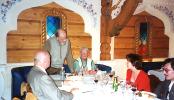 The
city contains 1, 209 shops and stores; 949 cafeterias, cafes, and
restaurants; 692 service centers; and 102 post offices. There are
73.9 medical doctors and 166 hospital beds for every 10, 000 inhabitants.
There are 32 tram routes, 17 trolleybus routes, and 42 bus routes.
There are also 500 taxicabs. The
city contains 1, 209 shops and stores; 949 cafeterias, cafes, and
restaurants; 692 service centers; and 102 post offices. There are
73.9 medical doctors and 166 hospital beds for every 10, 000 inhabitants.
There are 32 tram routes, 17 trolleybus routes, and 42 bus routes.
There are also 500 taxicabs.
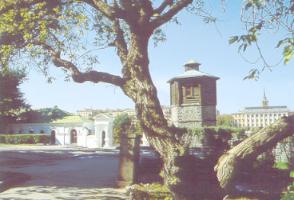 A
well-known cultural center, Yekaterinburg has dozens of public libraries,
cinema theaters, and music and art schools for children. The city's
philharmony, opera, ballet, playhouse, comedy and puppet theaters,
and children's theater are famous throughout Russia. Unique collections
contained in Yekaterinburg's art, sculpture, jewelry, and political
history museums attract thousands every year. The only movie studio
east of the Urals is located here. And recently, the city was selected
to host a series of prestigious musical, drama, and movie festivals. A
well-known cultural center, Yekaterinburg has dozens of public libraries,
cinema theaters, and music and art schools for children. The city's
philharmony, opera, ballet, playhouse, comedy and puppet theaters,
and children's theater are famous throughout Russia. Unique collections
contained in Yekaterinburg's art, sculpture, jewelry, and political
history museums attract thousands every year. The only movie studio
east of the Urals is located here. And recently, the city was selected
to host a series of prestigious musical, drama, and movie festivals.
Within city limits, there are 63 public - libraries, 12 museums,
1 philharmonic orchestra, 5 theaters, and 126 movie houses.
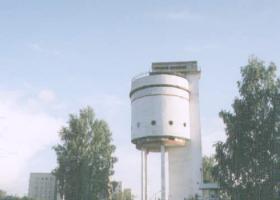 Yekaterinburg
is the center of political activity in the Urals and provides a
solid base for President Yeltsin. 91% of the city's voters supported
him in the 1991 elections, a national record. At the time of the
August 1991 coup d'etat, the city was chosen as an alternative headquarters
for the Russian government in case the democratic movement had not
prevailed in Moscow. Entrepreneurs and economically active citizens
of Yekaterinburg form a majority who support democracy and the drive
for market reform in the country. Yekaterinburg
is the center of political activity in the Urals and provides a
solid base for President Yeltsin. 91% of the city's voters supported
him in the 1991 elections, a national record. At the time of the
August 1991 coup d'etat, the city was chosen as an alternative headquarters
for the Russian government in case the democratic movement had not
prevailed in Moscow. Entrepreneurs and economically active citizens
of Yekaterinburg form a majority who support democracy and the drive
for market reform in the country.
Yekaterinburg has 18 political parties and 15 organized social
movements.
Yekaterinburg today is intensively developing economic and cultural
ties with foreign countries. Representatives from German, Hungarian,
Chinese, Japanese and other foreign firms work in the city, and
soon an American consulate and French and Italian cultural centers
will open here. Yekaterinburg enjoys a unique geographic location
on the border between Europe and Asia and thus prospers from the
interaction of economies from both East and West.
41 joint ventures are registered in the city. Yekaterinburg-based
enterprises have permanent contacts with firms from more than 20
countries around the world.
|